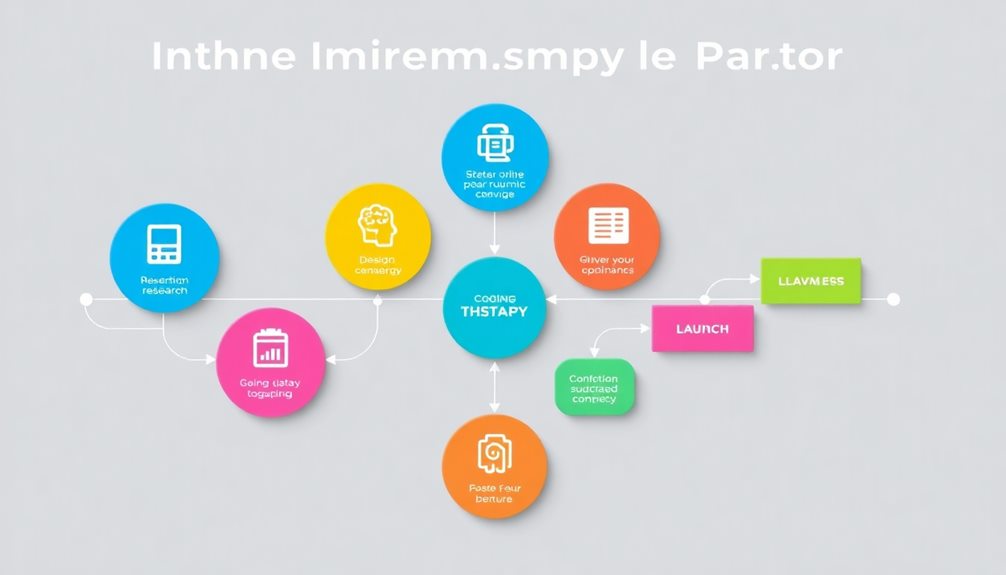Building an online therapy platform starts with understanding user needs and ensuring compliance with regulations like HIPAA and GDPR. You'll want to incorporate key features such as secure user registration, appointment management, and effective payment processing. A user-friendly interface is essential for enhancing the experience, especially on mobile devices. With the market projected to grow considerably, consider revenue models like subscriptions for consistent income. Focus on security and client engagement to build trust. As you explore options, you'll discover many innovative strategies that can elevate your platform's success.
Key Takeaways
- Implement secure user registration and data encryption to ensure HIPAA compliance and protect sensitive patient information.
- Develop a user-friendly interface with mobile compatibility and advanced search options to enhance user experience.
- Integrate real-time appointment management and secure payment processing for seamless user interactions.
- Conduct extensive testing prior to launch to ensure platform functionality and user satisfaction.
- Stay updated with evolving regulations to maintain compliance and enhance data security measures.
Understanding Online Therapy Platforms

When it comes to seeking mental health support, many people are turning to online therapy platforms for their convenience and accessibility. These platforms, like BetterHelp and Brightside, connect you with licensed therapists through various modalities, including video, phone, and messaging.
This flexibility enhances your access to care, allowing you to choose what works best for your schedule and comfort level. As with any investment, it's important to assess your risk tolerance, much like evaluating risk management strategies in other fields.
The online therapy market is rapidly expanding, projected to grow from $2.6 billion in 2021 to $8.2 billion by 2030. This surge indicates a growing preference for virtual mental health services over traditional in-person visits.
Online therapy platforms prioritize your privacy, complying with regulations like HIPAA to safeguard your sensitive information. User satisfaction rates are high, with platforms like BetterHelp boasting an impressive 86% satisfaction rate.
Their extensive network of licensed therapists, combined with supportive features such as journaling and group sessions, makes it easier for you to find the help you need. With flexible subscription plans or pay-per-visit options, online therapy services offer a cost-effective alternative, ensuring you can receive essential mental health support without the burden of insurance complications.
Key Features for Development

As online therapy platforms continue to grow in popularity, implementing key features for development becomes crucial for their success. A secure user registration system is essential for both patients and therapists, guaranteeing personal information is protected and compliant with HIPAA regulations. You'll also want real-time appointment management features that let users book, reschedule, and receive automated reminders to minimize no-show rates.
Another critical aspect is high-quality, HIPAA-compliant video conferencing capabilities. This guarantees effective therapy sessions while maintaining confidentiality through encryption protocols. To facilitate seamless transactions, integration of secure payment processing options is necessary, accommodating various methods like credit cards and PayPal.
Lastly, a user-friendly interface with advanced search and filtering options enhances user experience, allowing patients to easily find therapists based on specific criteria.
| Feature | Description |
|---|---|
| Secure User Registration | Protects personal information and guarantees compliance with HIPAA. |
| Real-time Appointment Management | Enables booking, rescheduling, and reminders. |
| High-Quality Video Conferencing | Guarantees effective therapy sessions with encryption. |
| Secure Payment Processing | Supports multiple payment methods for convenience. |
Market Trends and Growth

The online therapy services market is experiencing explosive growth, projected to soar from $2.6 billion in 2021 to an astounding $8.2 billion by 2030. This surge reflects an increasing demand for virtual mental health support, making it vital for platforms to leverage user data effectively.
As more people embrace the convenience of online therapy, you'll find that access to mental health care has never been more straightforward. Understanding the importance of Cultural Intelligence (CQ) is essential for creating a platform that caters to diverse user needs and enhances communication in multicultural contexts.
Here are three key trends driving this growth:
- Increased Accessibility: Teletherapy is breaking barriers for underserved populations, especially those in remote areas or with mobility issues.
- Effective Outcomes: A recent survey showed that 87% of over 2,000 users experienced symptom reduction through online therapy, proving its efficacy.
- User-Friendly Features: Platforms that integrate diverse mental health solutions and intuitive design attract a broader patient base, enhancing user engagement.
In this evolving landscape, understanding these trends will help you develop a more effective online therapy platform that meets the needs of today's users and contributes positively to their mental health care journey.
Business Models and Strategies

When considering business models for your online therapy platform, you'll find that revenue models like pay-per-visit and subscription-based approaches each have their unique advantages.
Engaging your target audience effectively is key to building a loyal user base, and understanding diverse marketing strategies can help you achieve that.
Additionally, fostering an online community around your platform can enhance user engagement and support.
The implementation of proactive strategies can also lead to a more satisfied and resilient user base.
Let's explore how these elements come together to create a successful platform.
Revenue Models Comparison
While exploring revenue models for online therapy platforms, it's clear that both pay-per-visit and subscription-based options have their unique advantages.
The subscription-based model, for instance, can greatly enhance user retention and provide a predictable revenue stream. Platforms like BetterHelp and Brightside exemplify this by offering unlimited messaging and integrated services.
Here are three key points to reflect on:
- Financial Predictability: Subscription plans typically range from $95 to $450 per month, allowing platforms to forecast revenue more accurately.
- Increased Engagement: Incorporating an online pharmacy into the revenue model can't only engage patients better but also create additional income sources for the platform.
- Market Growth Potential: The online therapy services market is projected to surge from $2.6 billion in 2021 to $8.2 billion by 2030, emphasizing the need for diverse revenue models.
Target Audience Engagement
Effectively engaging your target audience for an online therapy platform often requires a multifaceted approach. Start by offering diverse mental health solutions, like Wellin5, which provides over 25 services. This variety not only attracts users but also caters to their specific needs.
Implementing a subscription-based revenue model can foster long-term client relationships and guarantee consistent income, while making therapy sessions more affordable and accessible.
Consider integrating an online pharmacy with your services. This one-stop solution enhances patient engagement and convenience, making it easier for users to manage their mental health. User-friendly features and intuitive design are essential for a positive user experience.
Platforms like BetterHelp showcase high user satisfaction due to their extensive therapist network and simple provider-switching options.
Lastly, think about how effective marketing strategies can expand your reach. Partnering with mental health organizations and optimizing for SEO can attract a broader audience to your virtual therapy platform.
Marketing Approaches Overview
Engaging your target audience sets the stage for effective marketing approaches that can drive growth for your online therapy platform.
With the online therapy services market projected to soar from $2.6 billion in 2021 to $8.2 billion by 2030, there's a significant opportunity for you to establish a strong presence.
Here are some key marketing strategies to enhance user engagement:
- Diverse Business Models: Consider adopting pay-per-visit or subscription-based revenue models. This flexibility caters to different user preferences and can boost patient engagement.
- SEO Optimization & Social Media: Invest in SEO to improve your platform's visibility on search engines. Utilize social media promotion to connect with potential users and build a supportive community around mental health.
- Partnerships with Healthcare Organizations: Collaborate with healthcare providers to expand your reach. These partnerships can enhance credibility and attract users seeking reliable online therapy solutions.
Compliance and Legal Considerations

Managing compliance and legal considerations is essential for online therapy platforms. You need to guarantee adherence to strict data privacy regulations, such as HIPAA in the U.S., which protects sensitive patient information and imposes hefty fines for non-compliance. If you're serving clients from the EU, compliance with GDPR is also fundamental, requiring explicit consent for data processing.
Regular security audits are critical to maintain compliance with health and privacy laws. These audits help you identify vulnerabilities and implement necessary updates to prevent data breaches that can damage user trust.
Here's a quick overview of key compliance areas:
| Compliance Area | Description | Importance |
|---|---|---|
| HIPAA Compliance | Protects patient information in the U.S. | Avoids significant fines |
| GDPR Compliance | Requires consent for data processing in the EU | Safeguards user rights |
| Security Audits | Regular assessments of security measures | Maintains user trust |
Security Measures and Protocols

When developing your online therapy platform, you'll need to prioritize data encryption standards to protect sensitive patient information from unauthorized access.
Compliance with regulations like HIPAA is essential for maintaining confidentiality and trust in your service.
Data Encryption Standards
Guaranteeing the confidentiality of patient information is paramount in online therapy, and data encryption standards play a significant role in achieving this security. By employing robust encryption techniques, you can protect sensitive patient data during teletherapy sessions, keeping communications safe from unauthorized access.
Here are three essential data encryption standards to evaluate:
- Advanced Encryption Standard (AES): Utilizing AES with a 256-bit key guarantees that data transmitted between clients and therapists is securely encrypted, making it nearly impossible for malicious actors to intercept.
- SSL/TLS Certificates: Implementing these certificates encrypts data exchanged over the internet, which is critical for maintaining compliance with HIPAA regulations in online therapy platforms.
- Regular Security Audits: Conducting periodic security audits and penetration testing is imperative. This helps identify vulnerabilities in your encryption methods, guaranteeing that patient data remains protected against emerging cyber threats.
Compliance With Regulations
Compliance with regulations is essential for online therapy platforms, especially given the sensitive nature of patient information. Adhering to HIPAA regulations guarantees the confidentiality and security of your clients' data, protecting you from significant fines and legal repercussions.
Implementing encryption protocols for video conferencing and data storage is critical; it safeguards sensitive patient data from cyber threats and unauthorized access.
Two-factor authentication enhances login security, adding an extra layer of protection against potential breaches. This guarantees that only authorized individuals can access sensitive information.
Regular security audits are important for identifying vulnerabilities within your platform. By conducting these audits, you can make timely updates and improvements to maintain compliance with industry standards.
Moreover, having robust data backup procedures is essential. This prevents data loss and assures that patient records and session notes are recoverable in the event of a system failure or security breach.
Development Process Steps

Developing an online therapy platform involves several essential steps that lay the foundation for its success.
To start, you'll need to conduct thorough research and planning. This helps you analyze market needs, demographics, and regulatory compliance, guaranteeing you understand your target audience.
Next, selecting the right technology stack is imperative. You'll want to choose frontend options like React or Angular, and backend technologies such as Node.js or Python, based on functionality and scalability requirements.
Finally, pay close attention to user interface design. An intuitive and mobile-friendly navigation experience is fundamental for enhancing user engagement during therapy sessions.
Throughout the development process, verify that you're implementing robust security measures, including encryption protocols and two-factor authentication, to protect sensitive patient information.
In summary, follow these key steps to create a successful online therapy platform:
- Conduct extensive research and planning.
- Select an appropriate technology stack that meets your needs.
- Design an intuitive user interface while maintaining strong security measures.
Client Engagement Techniques

To enhance client engagement, you should implement instant acknowledgment protocols that make users feel recognized right away.
Pairing this with continuous communication strategies guarantees that clients stay informed and connected throughout their therapy journey.
These techniques not only build trust but also encourage active participation, leading to better outcomes.
Instant Acknowledgment Protocols
In the fast-paced world of online therapy, implementing instant acknowledgment protocols greatly boosts client engagement. When you respond quickly to client inquiries or submissions, you foster a sense of trust and attentiveness, which enhances overall client satisfaction.
Studies reveal that rapid follow-up communications can increase client satisfaction rates by over 30%.
Here are three effective techniques for utilizing instant acknowledgment protocols:
- Automated Messaging Systems: These streamline the acknowledgment process, allowing your team to focus on meaningful interactions while providing prompt responses.
- Quick Surveys: After acknowledging a client's message, send a brief survey to solicit feedback. About 87% of clients feel valued when their input is actively sought, leading to higher client satisfaction.
- Regular Updates: During the project lifecycle, keep clients informed with updates and feedback requests. This practice can considerably improve user engagement and increase client retention rates by up to 50%.
Continuous Communication Strategies
Effective continuous communication strategies are vital for keeping clients engaged throughout the development process. Start by implementing immediate acknowledgments of project submissions and prompt follow-ups from client success representatives. This approach enhances engagement right from the beginning.
Throughout the development, maintain consistent communication by providing regular updates and feedback loops, guaranteeing clients are informed and involved.
Creating a user-friendly interface is essential, allowing users to easily access project details and facilitating ongoing dialogue between clients and therapists. This guarantees that all parties feel connected and valued during the process.
Encourage continuous feedback from clients to refine project details, which not only improves satisfaction but also fosters a sense of collaboration and investment in the project's success.
Utilizing automated systems can streamline communication, assuring timely responses and reducing delays. This enhances overall engagement, as clients appreciate prompt customer support and feel more involved in their journey.
Challenges in Development

Developing an online therapy platform presents a unique set of challenges that can greatly impact its success. One of the most pressing issues is ensuring data security. You need to comply with strict regulations like HIPAA, which requires robust data protection measures. This means implementing advanced encryption protocols and conducting regular security audits to safeguard sensitive patient information from cyber threats.
Additionally, user adoption can be a hurdle. Many therapists and clients may not be tech-savvy, which can slow down the platform's growth. It's important to provide straightforward user interfaces and educational resources to help ease this change.
Finally, maintaining seamless video conferencing is vital. Connectivity issues can disrupt sessions and negatively affect both user experience and therapy outcomes.
Here are three key challenges to keep in mind:
- Data Security: Adhering to regulations and protecting sensitive information.
- User Adoption: Overcoming technological barriers for therapists and clients.
- Teletherapy Options: Ensuring reliable video conferencing and innovative features to stand out in a competitive market.
Future of Online Therapy Platforms

The future of online therapy platforms promises exciting advancements that could reshape mental health care. As the online therapy services market is projected to soar from $2.6 billion in 2021 to $8.2 billion by 2030, you can expect a significant increase in demand for virtual mental health support.
Future platforms will likely incorporate advanced technologies like AI and data analytics, enhancing personalized care and improving patient outcomes. Mobile integration will become essential, offering user-friendly apps that guarantee seamless access to therapy services anytime, anywhere.
With teletherapy gaining traction, you'll see a strong focus on compliance with evolving regulations and robust data security measures to protect your information.
Moreover, the rise of hybrid therapy models, which combine in-person and online sessions, will provide greater flexibility. This means you can choose the format that best suits your needs, making mental health care more accessible than ever.
As these features evolve, you'll find that online therapy platforms not only offer convenience but also a tailored experience that prioritizes your well-being. The future looks bright for virtual mental health support, paving the way for more effective and inclusive care.
Frequently Asked Questions
What Is the World's Largest Online Therapy Platform?
You might be surprised to learn that BetterHelp is the world's largest online therapy platform. It connects clients with licensed therapists through various communication methods, making mental health support more accessible than ever before.
How Big Is the Online Therapy Market?
The online therapy market's booming, reaching $8.2 billion by 2030. You're not alone; everyone seeks convenient care. With increased demand and digital options, mental health support is more accessible than ever before.
Is Online Therapy Becoming More Popular?
Yes, online therapy's becoming more popular. You'll find many people appreciate its accessibility and flexibility. With high satisfaction rates, it's clear that more individuals are choosing virtual mental health support over traditional in-person sessions.
Is Online Therapy a Thing?
Yes, online therapy's definitely a thing! You can connect with licensed therapists through video, phone, or messaging, making it easier to get the mental health support you need, anytime and anywhere. It's convenient and accessible!
Conclusion
In crafting your online therapy platform, think of it as a bridge—connecting those in need with the support they seek. Just as a sturdy bridge withstands the test of time, your platform must prioritize user experience and compliance to thrive in this growing market. With mental health needs rising, you're not just building a service; you're creating a lifeline. Embrace the journey, stay adaptable, and watch as your platform transforms lives, one session at a time.









